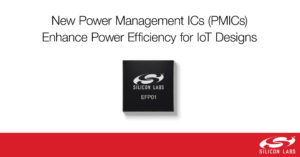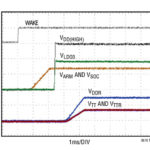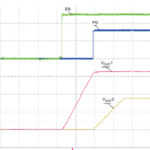 Silicon Labs announces a new line of energy-friendly power management ICs (PMICs) serving as dedicated companion chips for EFR32 wireless devices and EFM32 microcontrollers (MCUs). The EFP01 PMIC family provides a flexible, system-level power management solution enhancing the energy efficiency of battery-powered applications including IoT sensors, asset tags, smart meters, home and building automation, security, and health and wellness products. These feature-rich PMICs enable developers to choose the optimal battery type and chemistries for their applications while controlling a product’s power supply over multiple output rails and voltages.
Silicon Labs announces a new line of energy-friendly power management ICs (PMICs) serving as dedicated companion chips for EFR32 wireless devices and EFM32 microcontrollers (MCUs). The EFP01 PMIC family provides a flexible, system-level power management solution enhancing the energy efficiency of battery-powered applications including IoT sensors, asset tags, smart meters, home and building automation, security, and health and wellness products. These feature-rich PMICs enable developers to choose the optimal battery type and chemistries for their applications while controlling a product’s power supply over multiple output rails and voltages.
Developers often use PMICs to meet the unique low-power requirements of their IoT designs. Yet selecting the right PMIC from among thousands of parts offered by catalog distributors can be challenging and time-consuming, adding complexity for developers under time-to-market pressures. Silicon Labs’ PMIC solution addresses the power management needs of IoT developers by extending the energy efficiency of its wireless and MCU products while simplifying product design with best-in-class tools and support.
EFP01 PMICs simplify power system design and reduce power consumption through enhanced control. The PMICS include low-voltage dc-dc converters and regulators along with a flexible mechanism to manage the power rails in a system design.
The EFP01 PMIC family provides a rich set of features enabling developers to optimize their IoT designs for energy efficiency and extended battery life:
- Flexible input/output voltage: A wide input voltage range (0.8 V to 5.5 V) supports an array of batteries; wide output voltages support a variety of peripherals, MCUs and radios.
- Flexible use cases: The PMICs enable buck and boost voltage conversion as well as combined boost and buck (“boost bootstrap”) supporting low-voltage, high-current rails for IoT products requiring coin cell batteries and higher transmit power (up to +20 dBm).
- Multiple output power rails: This feature allows an entire IoT product to be powered by one low-cost PMIC, using less board real estate and simplifying software/hardware design.
- Low quiescent current: Unlike many PMICs, the EFP01 is optimized for sleepy devices, offering quiescent current as low as 150 nA to reduce sleep current and enhance battery life.
- Coulomb counting: The EFP01 supports coulomb counting (a feature offered by few PMIC solutions), offering vital information for battery life estimation and preventive maintenance.
Samples and production quantities of EFP01 PMICs in a 3 mm x 3 mm QFN20 package are available now, with prices starting at $0.55 (USD MSRP) in 10,000-unit quantities. Three development boards are available including the SLWRB4179B radio board priced at $39 (USD MSRP) and two PMIC evaluation boards each priced at $49 (USD MSRP). Simplicity Studio, available to developers at no charge, offers energy profiler and network analyzer tools, wireless stacks and reference designs. To order PMIC samples and boards, visit silabs.com/efp01.




Leave a Reply